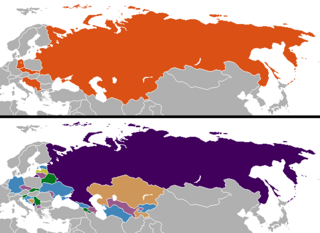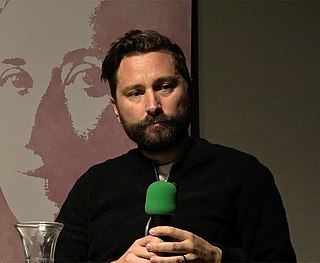
Francis Yoshihiro Fukuyama is an American political scientist, political economist, international relations scholar and writer.
A nation is a community of people formed on the basis of a combination of shared features such as language, history, ethnicity, culture and/or society. A nation is thus the collective identity of a group of people understood as defined by those features. Some nations are equated with ethnic groups and some are equated with affiliation to a social and political constitution. A nation is generally more overtly political than an ethnic group. A nation has also been defined as a cultural-political community that has become conscious of its autonomy, unity and particular interests.

The Clash of Civilizations is a thesis that people's cultural and religious identities will be the primary source of conflict in the post–Cold War world. The American political scientist Samuel P. Huntington argued that future wars would be fought not between countries, but between cultures. It was proposed in a 1992 lecture at the American Enterprise Institute, which was then developed in a 1993 Foreign Affairs article titled "The Clash of Civilizations?", in response to his former student Francis Fukuyama's 1992 book, The End of History and the Last Man. Huntington later expanded his thesis in a 1996 book The Clash of Civilizations and the Remaking of World Order.
Neorealism or structural realism is a theory of international relations that emphasizes the role of power politics in international relations, sees competition and conflict as enduring features and sees limited potential for cooperation. The anarchic state of the international system means that states cannot be certain of other states' intentions and their security, thus prompting them to engage in power politics.

An ethnic conflict is a conflict between two or more contending ethnic groups. While the source of the conflict may be political, social, economic or religious, the individuals in conflict must expressly fight for their ethnic group's position within society. This criterion differentiates ethnic conflict from other forms of struggle.

International relations (IR) are the interactions between sovereign states. The scientific study of those interactions is called international studies, or international affairs. In a broader sense, it concerns all activities between states—such as war, diplomacy, trade, and foreign policy—as well as relations with and among other international actors, such as intergovernmental organisations (IGOs), international nongovernmental organisations (INGOs), international legal bodies, and multinational corporations (MNCs). There are several schools of thought within IR, of which the most prominent are realism, liberalism, and constructivism.
World government is the concept of a single political authority with jurisdiction over all humanity. It is conceived in a variety of forms, from tyrannical to democratic, which reflects its wide array of proponents and detractors.

The End of History and the Last Man is a 1992 book of political philosophy by American political scientist Francis Fukuyama which argues that with the ascendancy of Western liberal democracy—which occurred after the Cold War (1945–1991) and the dissolution of the Soviet Union (1991)—humanity has reached "not just ... the passing of a particular period of post-war history, but the end of history as such: That is, the end-point of mankind's ideological evolution and the universalization of Western liberal democracy as the final form of human government." For the book, which is an expansion of his essay "The End of History?", Fukuyama draws upon the philosophies and ideologies of Georg Wilhelm Friedrich Hegel and Karl Marx, who define human history as a linear progression, from one socioeconomic epoch to another.

Samuel Phillips Huntington was an American political scientist, adviser, and academic. He spent more than half a century at Harvard University, where he was director of Harvard's Center for International Affairs and the Albert J. Weatherhead III University Professor.
The term "new world order" refers to a new period of history evidencing dramatic change in world political thought and the balance of power in international relations. Despite varied interpretations of this term, it is primarily associated with the ideological notion of world governance only in the sense of new collective efforts to identify, understand, or address global problems that go beyond the capacity of individual nation-states to solve.
Modernization theory is used to explain the process of modernization within societies. The "classical" theories of modernization of the 1950s and 1960s drew on sociological analyses of Karl Marx, Emile Durkheim and a partial reading of Max Weber, and were strongly influenced by the writings of Harvard sociologist Talcott Parsons. Modernization theory was a dominant paradigm in the social sciences in the 1950s and 1960s, then went into a deep eclipse. It made a comeback after 1991, when Francis Fukuyama wrote about the end of the Cold War as confirmation on modernization theory and more generally of universal history. But the theory remains a controversial model.

American nationalism is a form of civic, ethnic, cultural or economic influences found in the United States. Essentially, it indicates the aspects that characterize and distinguish the United States as an autonomous political community. The term often explains efforts to reinforce its national identity and self-determination within its national and international affairs.

Robert David Kaplan is an American author. His books are on politics, primarily foreign affairs, and travel. His work over three decades has appeared in The Atlantic, The Washington Post, The New York Times, The New Republic, The National Interest, Foreign Affairs and The Wall Street Journal, among other newspapers and publications.
Transnational progressivism is a concept coined by Hudson Institute fellow John Fonte about an umbrella movement that seeks to take ultimate political power away from parliaments and legislative bodies accountable to national electorates in sovereign states, and to vest it in courts, bureaucracies, NGOs, and various transnational bodies that are accountable only to themselves or to other transnational bodies. In the book "Sovereignty or Submission: Will Americans Rule Themselves or Be Ruled by Others?", Fonte describes key concepts of the movement, its conceptual framework, its ideology, the underlying philosophical tradition upon which the ideology is based, the main protagonists of the movement, and calls attention to the danger that transnational progressivism represents for traditional Western nation-centered liberal democracy.
In international relations theory, the concept of anarchy is the idea that the world lacks any supreme authority or sovereignty. In an anarchic state, there is no hierarchically superior, coercive power that can resolve disputes, enforce law, or order the system of international politics. In international relations, anarchy is widely accepted as the starting point for international relations theory.
America at the Crossroads: Democracy, Power, and the Neoconservative Legacy is a 2006 book written by Francis Fukuyama.
The Beijing Consensus or China Model, also known as the Chinese Economic Model, is the political and economic policies of the People's Republic of China (PRC) that began to be instituted by Deng Xiaoping after Mao Zedong's death in 1976. The policies are thought to have contributed to China's "economic miracle" and eightfold growth in gross national product over two decades. In 2004, the phrase "Beijing Consensus" was coined by Joshua Cooper Ramo to frame China's economic development model as an alternative—especially for developing countries—to the Washington Consensus of market-friendly policies promoted by the IMF, World Bank, and U.S. Treasury. In 2016, Ramo explained that the Beijing Consensus shows not that "every nation will follow China’s development model, but that it legitimizes the notion of particularity as opposed to the universality of a Washington model".

The post–Cold War era is a period of history that follows the end of the Cold War, which represents history after the dissolution of the Soviet Union in December 1991. This period saw many former Soviet Republics become sovereign nations, as well as the introduction of market economies in eastern Europe. This period also marked the United States becoming the world's sole superpower.
The end of history is a political and philosophical concept that supposes that a particular political, economic, or social system may develop that would constitute the end-point of humanity's sociocultural evolution and the final form of human government. A variety of authors have argued that a particular system is the "end of history" including Thomas More in Utopia, Georg Wilhelm Friedrich Hegel, Karl Marx, Vladimir Solovyov, Alexandre Kojève, and Francis Fukuyama in the 1992 book, The End of History and the Last Man.

Quinn Slobodian is a Canadian historian of modern Germany and international history who has been Marion Butler McLean Professor of the History of Ideas at Wellesley College since 2022. He previously was a Residential Fellow at the Weatherhead Center for International Affairs, Harvard University in 2017–8.









